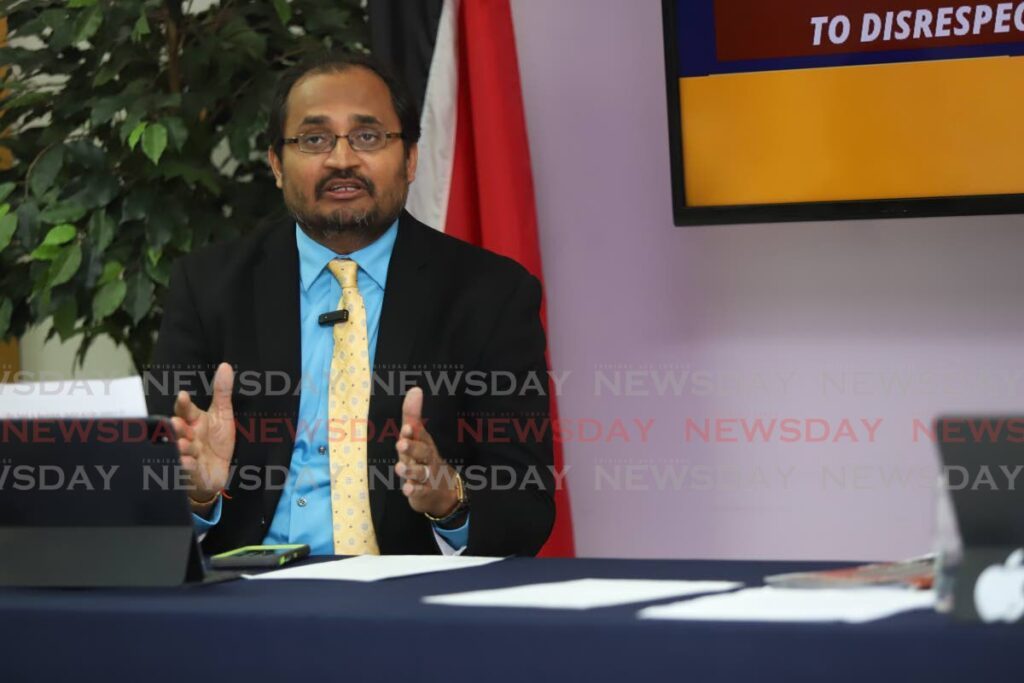Constitution report: We the (PNM) People?

DINESH RAMBALLY
AMIDST THE manufactured controversy about the steelpan on the coat of arms, another issue of importance has been neglected: the report of the constitutional reform committee, “We the People,” which screams for attention.
The first enormity evident in its 206 pages is that “We the People” could be called “We the PNM People.” The committee's chairman, Barendra Sinanan, was a former PNM House Speaker. The PNM ideology is visible in the first line of the proposed revised constitution, which reads:
“Acknowledging the history, suffering, exploitation and discrimination inflicted under colonialism on our people, the strength of our First Peoples, and our enduring resilience, creativity, enterprise and indomitable will…” (p105). This means the nation’s origins in victimhood and entitlement stemming therefrom, a part of the PNM worldview, will be institutionalised.
That aside, the report visits many sensitive areas: proportional representation; the offices of Chief Justice, DPP, President and others; service commissions, the judiciary, the Integrity Commission; the Privy Council (PC) vs the Caribbean Court of Justice (CCJ); and the status of Tobago, among others.
I wish to address a few interconnected political (and not strictly legal) issues. These include “culture” which figures prominently, proportional representation, and the Privy Council.
The committee, like the Government, favours the abolition of judicial appeals to the PC, preferring the CCJ. From its data (p43) of 130 recommendations on the issue, 50 wanted the change. The document does acknowledge that many people deeply distrust the local courts but neglects a relevant statistic: how many cases of importance have been reversed by the PC after being affirmed by local courts.
The section on the PC (paras 4.22-4) is short and dismissive. But the answer to the question of distrust is to be found in the epigraph to this section: “The interpretation of a constitutional text is the discursive practice whereby meaning is given to the text that constitutes a people’s political identity.” If the committee understood this statement, it would understand why the PC remains the choice many citizens, including myself.
There is no single “political identity,” not in TT, not elsewhere. Political identity is an assemblage of ethnicity, history and cultural practices. It is a major source of conflict worldwide: Sunni-Shia, Hindu-Muslim, Democrat-Republican, Labour-Conservative. There are at least three separate and conflicting political identities in TT now: Afro, Indo and Tobago. This report, like everything else the PNM espouses, pretends there’s only one: its own.
This question of identity links to the ubiquitous “culture” question. The report introduces something called “cultural rights” (p63), which it admits are difficult to define. What is troublesome is that the report also explicitly highlights disadvantages faced by “African” young men in the education and justice systems.
The connection between cultural rights and these deficits have already been made by a group of PNM personalities in widely circulated articles a few years ago: “The education of children of African origin.” It seems evident “cultural rights” will be a means to lobby for entitlements as reparation for these failures, and “culture” in this document means a device to leverage the Government’s political wishes and label dissent racist and unpatriotic, as is evident in the latest steelpan “controversy.”
That said, the committee disagrees with the Government in a few areas: it endorses a hybrid system of proportional representation (PR) originally proposed by the Wooding Commission, where the total number of votes is used to allocate Senate seats. It also endorses a fixed election date, referendums, and a right of recall. It transmits the public’s enthusiasm for prime ministerial term limits, though does not endorse. But it is unlikely these suggestions will come to anything.
In 1973, Eric Williams vehemently disavowed PR, saying its purpose was to “dissolve the People’s National Movement.” (The reason was simple: the PNM had gerrymandered the country so it could win elections with a minority.) It is unlikely the ideas of increasing democratic rights through referendums, recall and fixed election dates will be regarded differently by the current leadership.
There is, of course, much more. A few important things can only be listed here:
* The committee is not in favour of citizens’ access to firearms as a constitutional right.
* It wants to embed the steelpan’s status as the national instrument in the Constitution.
* It proposes expanding the Bill of Rights to include “cultural rights,” “environmental rights,” “economic rights,” and rights for alternative sexualities, as well as privacy and equality, and rights of detained or arrested people.
It proposes an expansion in the number of representatives in the House and Senate, restricting the number of ministries to 18, and the number of elected representatives who may be Cabinet ministers to eight.
In sum, the report is also considerably less sophisticated in intellectual probity than its first ancestor, the Wooding Commission Report (1974). But this is moot, as the Prime Minister’s recent antics suggest the whole exercise is destined for a fate similar to previous attempts – the Wooding, Hyatali and Ramadhar committees. So we now have another report which will be largely ignored, except this one will be deservedly ignored. Meanwhile, crime and chaos spread across the land like a disease.
Dinesh Rambally is the MP for Chaguanas West

Comments
"Constitution report: We the (PNM) People?"